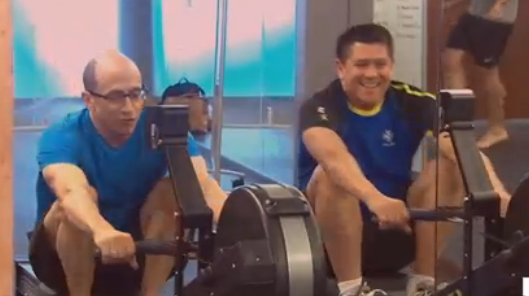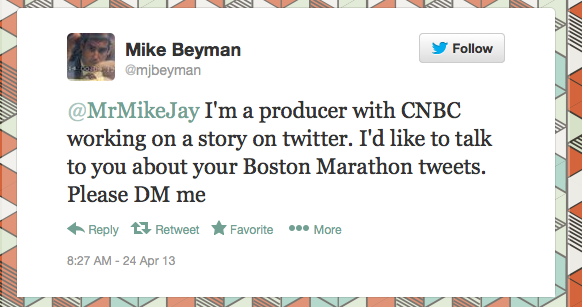
CNBCfix review: Carl Quintanilla’s Twitter questions are no sweat
Posted: Sunday, September 1, 2013
Carl Quintanilla is not infallible.
The affable CNBC host has scored numerous hits with stellar prime-time profiles, but "#TwitterRevolution," premiering in August 2013, is not one of them.
Quintanilla's hourlong production, executive-produced by Mitch Weitzner, jumps the shark in the 15th minute, when Quintanilla dons lycra to have a workout with Twitter chief Dick Costolo at the company gym. The visual implication is that the 2 are teammates in this effort, bolstered by Quintanilla's barely half-hearted effort to ask any questions of relevance.
Quintanilla, like Lester Holt in his Facebook profile on CNBC, never explains to the uninformed how a Twitter account actually works. Worse, he evaluates nothing for current users about the quality of the service. Is it easy or difficult to set up an account, upload a photo, retweet, or perhaps retweet to only selected users. Does one have to "friend" or "follow" to be part of the feed. Perhaps most importantly, is any Twitter message private, and is it possible to completely delete a tweet?
And what in the world is a "DM," which as you can see from the image below is how CNBC's crew made connections for this production:

The program differs markedly from Maria Bartiromo's 2009 examination of Google, which also lacked a timely news hook but made up for it with pointed questions for Eric Schmidt about privacy, and an explanation of how Adwords work and a profile of a business that thrived on them.
The inference one draws from Quintanilla's program is that Twitter is chaff. People do it … for the hell of it. It is not fueling anyone's business, nor is it wiping anyone out.
Airing on a business channel, one would expect business angles and dollar amounts. There are constant references on CNBC daily to stock/options/futures traders using Twitter, but nothing about that in this program. One industry seemingly on the Twitter fence would be print newspapers, who are both threatened by the explosion of electronic media and exploiting it to reach readers. This program is oblivious. Boston Herald reporter Dave Wedge, perhaps not realizing what kind of a dog-chasing-its-tail argument he is making, tells Quintanilla, "I have to keep Tweeting stuff or there's no reason for them to follow me."
There's another inference from "Revolution," that Twitter simply isn't very controversial. Airing months after the revelations of Edward Snowden, Quintanilla almost jaw-droppingly fails to ask Costolo what kind of data, if any, Twitter shares with the government, a sign of the program's discouraging chumminess with its subject.
The opening, a compelling recap of news dissemination of the Miracle on the Hudson and the Boston Marathon bombing, overrates the availability of Twitter and underrates the availability of camera phones. Quintanilla, while spotlighting the savvy amateur news hounds who alerted the world, discouragingly makes no mention to the countless erroneous tweets distributed in some instances by prominent figures identifying the wrong people as Marathon suspects.
Boston police spokeswoman Cheryl Fiandaca gives Quintanilla just the type of quotes this production was looking for … even if they made little sense. Fiandaca said that police can more effectively use Twitter than communicate to the professional news media, which she implied is making up its own facts; "we can tell our own story … we can put out the information directly on Twitter." Evidently a press conference or press release is unfathomable. Perhaps journalists can use Twitter to solve crimes, and then neither side will need the other.
Fiandaca also marvels that when police released photos of the suspects, "those things went viral," as if nobody would've noticed them 10 years ago in a pre-tweet world.
Quickly after the parched-dry Costolo interview, there is really nothing more in the remaining 40 minutes about Twitter. Quintanilla visits a high school in which a lot of bad things were said about the victims of a well-publicized crime. Then he plunges into celebrity-land, asking William Shatner, Chris Bosh, Manu Ginobili (how the latter 2 had time for this during the NBA Finals, one wonders) and Mark Burnett what Twitter means to them.
Torrington school superintendent Cheryl F. Kloczko, ignoring the presence of Facebook or local newspaper online reader comments or Topix sites, gives "Revolution" the kind of quote producers are eager for about student smearing; "in the old days, you wrote a note," or perhaps they even whispered about it at their lockers.
This gives Quintanilla a chance to mention "subtweeting," which is de facto identification of someone without identifying them.
Quintanilla hit home runs profiling McDonald's and Costco. Like many excellent CNBC documentaries, they continue to air for years on holidays and during stray time nighttime slots. "#TwitterRevolution" noticeably avoids delving into very many recent Twitter moments (good or bad), presumably to keep the show generically timely for repeat airings. Nowadays, given CNBC's nighttime emphasis on reality TV, "American Greed" and "60 Minutes," original documentary productions helmed by CNBC crews are a rare treat. If only Quintanilla had given Costolo a tougher workout.
#TwitterRevolution (2013)
Featuring: Janis Krums, Jack Dorsey, Dan Lampariello, Michael J. Ifill, Cheryl Fiandaca, Dave Wedge, Seth Mnookin, Andrew Kitzenberg, Dick Costolo, Nicholas G. Carr, William Shatner, Anthony Weiner, Matt DeRienzo, Cheryl F. Kloczko, Del Harvey, Trevor Mason, Chris Bosh, Melissa Rosenthal Brenner, Manu Ginobili, Ali Rowghani, Mark Burnett, Maryam Alkhawaja, Katie Jacobs Stanton
Reported by: Carl Quintanilla
Senior executive producer: Mitch Weitzner
Senior producer: Mary Noonan Robichaux
Producers: Na Eng, James Segelstein
Associate Producer: Michael Beyman
Lead editor: Patrick Ahearn
Editors: Allison E. Stedman, Richard Korn, John Werner
Camera: LeRoy Jackson, Marco Mastrorilli, Gerard Miller, Mark Neuling, David Dellaria, Brian Prentke
Additional camera: Mark Aster, Christopher Balcom, Victor Calderin, Mike Elwell, Carl Filoreto, Robert Goldsborough, David Grogan, Dana Hopper, William Irmscher, Raul Marin, Oscar Molina, Guy Morton, Robert Pearson, Hal Sloane, Ashley Stringer, Mike Vaughn
Audio: Bryan Baeta, Dan Cook, Mark Edelstein, Dave Foerder, Roberto Gomez, Drew Levinson, Rob Marez, Lupe Mejia, David Schumacher, Steve Theroux, Evertt Wong
Manager and chief photographer: Angel Perez
Director of post production: Vito Tattoli
Global creative director: Victoria Todis
Senior designer/animator: Jacqueline Dessel
Animator: Peter Kourkoumelis
Senior designer: Nick O'Connor
Field producer: Morgan Brasfield
Associate producer: Meghan Lisson
Coordinating producer: Christie Gripenburg
Production manager: Tracy Lawrence
Media coordinator: Richard Marko
Music librarians: Salvatore Carosone, George Lin, Lauren Ricci-Horn
Interns: Caitlin O'Kane, Melissa Adan, Alexandra Badalamenti
Senior vice president, long form programming: Ray Borelli